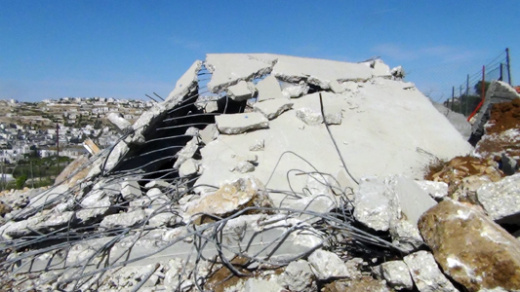- About
- News
-
Advocacy
- Accountability & Litigation
- International Advocacy
- National Advocacy
- Capacity Building
- Documentation
- FAI Unit
- Al-Haq Publications
- Library


- About
- News
-
Advocacy
- Accountability & Litigation
- International Advocacy
- National Advocacy
- Capacity Building
- Documentation
- FAI Unit
- Al-Haq Publications
- Library

Over the past few years, Israeli authorities have adopted a wide range of restrictions that make it almost impossible for Palestinians to obtain building permits or master plans for the development of their neighbourhoods in order to accommodate the population’s natural growth. The development of archeological parks and natural reserves can be amongst the reasons to confiscate Palestinian lands and destroying Palestinian property, all to benefit Israeli settlements and settlers.
Palestinian families are forced to build houses and other infrastructure without permits. Many families have sought legal assistance and gone through very expensive procedures to try to overturn demolition orders and challenge the denial of building permits but to no avail.
 In the last week, the Israeli occupying forces carried out five demolition operations across the West Bank, including in Hizma in northeast Jerusalem, and al-Maleh and Khirbet Yirza in the Jordan Valley. Amongst the structures targeted were three apartments, three houses and one building under construction, four shops and two shacks. Also during the past week, Israeli forces bulldozed three houses under construction west of al-‘Aroub refugee camp in Hebron governorate without presenting demolition orders. The houses, located in Area C, belonged to three people from the camp, who owned the land and wanted to build houses so they could move away from the densely populated camp.
In the last week, the Israeli occupying forces carried out five demolition operations across the West Bank, including in Hizma in northeast Jerusalem, and al-Maleh and Khirbet Yirza in the Jordan Valley. Amongst the structures targeted were three apartments, three houses and one building under construction, four shops and two shacks. Also during the past week, Israeli forces bulldozed three houses under construction west of al-‘Aroub refugee camp in Hebron governorate without presenting demolition orders. The houses, located in Area C, belonged to three people from the camp, who owned the land and wanted to build houses so they could move away from the densely populated camp.
Al-Haq has also documented the uprooting of 1000 olive, cactus and almond saplings, from privately-owned Palestinian lands by Israeli authorities in the village of Beit Dajan in Nablus governorate and the area of ‘Um Nir southeast of Yatta in Hebron governorate, under the pretence that the lands had been confiscated. Jamal Muhamad Kan’an, 63, from Beit Dajan, saw the Israeli army uproot and confiscate his saplings from his 40-dunum-land (one dunum equals 1,000 m²) for the sixth time. (Al-Haq Affidavit No. 8559/2013)
Kayed Muhammad al-Jaradat – Al-Tur Neighbourhood
In 1991, Kayed, 63, bought a one-dunum piece of land in al-Tur neighbourhood east of the Old City of Jerusalem and built a bigger house for his 16 member-family. Three of his children are blind and three are epileptic. In 1997, Kayed received a demolition order and a 30,000 NIS (approximately USD 8,400) fine from the Jerusalem municipality, whose unilaterally drawn borders were established by Israel in 1967 when it illegally annexed East Jerusalem. Despite the fact that Kayed paid the fine, his house was demolished by the Israeli authorities four years later. For three years, Kayed and his family had to live in temporary wooden shacks until he built a new house on his land. One month later, he received another demolition order for his new house and a fine of 80,000 NIS (about USD 22,000) that he has to pay in installments within ten years. In addition, Kayed had to pay approximately USD 30,000 for legal and administrative assistance for the failed attempt to obtain a building permit.
Kayed decided to build apartments for three of his as they could not afford to pay high rent for their homes anymore. In August 2012, after consulting with his lawyer who assured him that he would overturn any demolition order, Kayed started building three apartments for his sons and two storage rooms next to his house in order to open a supermarket for himself as he is unemployed. Twenty days later, the municipal employees came to his house, took photos of the new structures and gave him an order to stop the construction work. Kayed continued working on the building that cost him approximately 400,000 NIS (approximately USD 112,000), reassured by his lawyer that the order would be overturned.
On 26 April 2013, at 7:00 am, Kayed saw a large number of Israeli forces, including two bulldozers, approaching his house. Kayed thought that the bulldozers were going to demolish his current house since his lawyer had guaranteed that his new structure was not going to be demolished. However, the soldier in charge of the demolition operation ordered Kayed and his family members to leave the old house since they were going to bulldoze the new structure. Kayed recalls that they threatened to destroy both homes if he continued to argue.
Within a period of two hours, Kayed watched from his neighbour’s house as bulldozers flattened his new building. Kayed’s wife could not tolerate the scene and lost consciousness. At the time of writing, Kayed went back to live in his old house in thousands of dollars of debts. (Al-Haq Affidavit No. 8558/2013)